Music Through Journeys
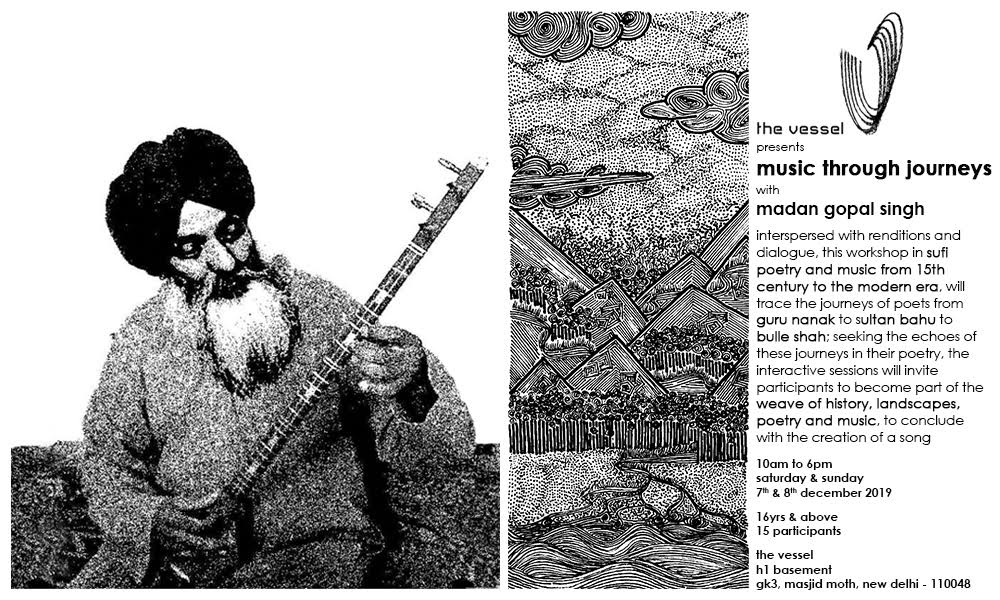
about the workshop
Dr Madan Gopal Singh accompanied by musicians Deepak Castelino on the guitar and Pritam Goshal on the sarod conducted an intense weekend workshop across 4 sessions on Sufi poetry and music in December 2019 at the Vessel. Beginning around the 14th – 15th century, Dr Singh traced the development of sufi music and poetry in the subcontinent with special attention to tracing the effect of journeys and travels on the lives and work of significant sufi poets from Rabia Basri as early as the 10th century to Baba Bulle Shah in the 18th Century.
On day one the first session began with a brief discussion on history where Dr. Singh laid out the social, cultural and political background beginning from the 10th century, within which the Sufi poetry and music of this region, 15th century onwards, evolved. He spoke of the travels and journeys that were taking place at that time through which the poetry and music came to India and the various histories involved.
He also briefly discussed the two strands of Sufism: one that is more formalized and follows the caste hierarchies of Islam, the other that is born out of exchanges and encounters that happen as people are travelling along the trade route i.e the silk route from central Asia to India and vice versa. Although the travels were primarily undertaken for trade there was a cultural exchange that was taking place because people brought along their musicians & instruments. As a result something new was born when different languages and music came together.
Within this narrative he moved on to the individual poets whose work has had a significant impact on the evolution of Sufi music and poetry in this region. Beginning with the very early poetess Rabia Basri who lived in the late 8th early 9th century Dr. Singh spoke of the significance of her being a very poor slave, a non caste muslim and a woman. He then moved on to Baba Farid who lived in the 12th century. Themes of mocking selfhood and the gradual opening up the ethic of love or ishq characterised Baba Farid’s poetry.
In Amir Khusrao the opening of the idea of space and idea of the feminine erotic entering the space was explained.
The second session proceeded with a comprehensive discussion of the poetry of Kabir and Gurunanak. In Kabir the tension felt by the self that oscillates between the nomad and the monad as forming the existential base from where the poetry comes forth was explored. Kabir’s poetry is not only political but is a call for standing up and owning up to one’s responsibility. In Gurunanak, the quintessential traveler there is the theme of the idea of wonderment which is beautifully seen in the Aarti and his poem Vismad. Stories of his friendship with Mardana and his travels as a fakir for more than thirty years created the context in which he lead his life and developed his philosophy.
On day two, in the first session, the three poets Shah Hussain – 16th Century, Hazrat Sultan Bahu – 17th Century and Baba Bulleh Shah – 18th Century were discussed.
Shah Hussain was a weaver wrote bulk of his poetry for his partner Madhav Lal. His poetry was about the everyday lived space of ordinary people like the dyer, the trader, the woman on the spinning heel etc. It was deeply rooted in the pain of inequality and separation. Women take on a very important and powerful role in his poems. The phenomenal poem Saalu speaks of the lives & desires of women. One can also see the idea of the sub continental space forming in this poem where there are references to the different states of the subcontinent like Kashmir, Gujarat, Bengal etc. The poetic genre of the si harfi was discussed in the context of Sultan Bahu’s poetry who wrote a bulk of the poetry in this form. Baba Bulle Shah’s poetry was discussed in the background of his relationship with his teacher Shah Inayat. Both Sultan Bahu and Baba Bulle Shah contributed significantly to recognizing non canonical street sufism and incorporating it in their work.
Each poet’s life was placed in the history and context in which they lived through stories and larger narratives. Their poems were rendered by Dr. Singh and his accompanists in their unique & personal musical style which created an immersive experience.
The work shop culminated with a discussion in the final session on the nature of sufi music in the present time. The influence it has had on music of Indian film industry in the 50’s & 60’s and how the language & poetry in the Punjabi music today reflects very different histories & landscapes. One can begin to see how poetry and music becomes a register of a time.
We finally closed with the singing and recording of Kabir’s phenomenal & inspiring poem Anand together.
the performers
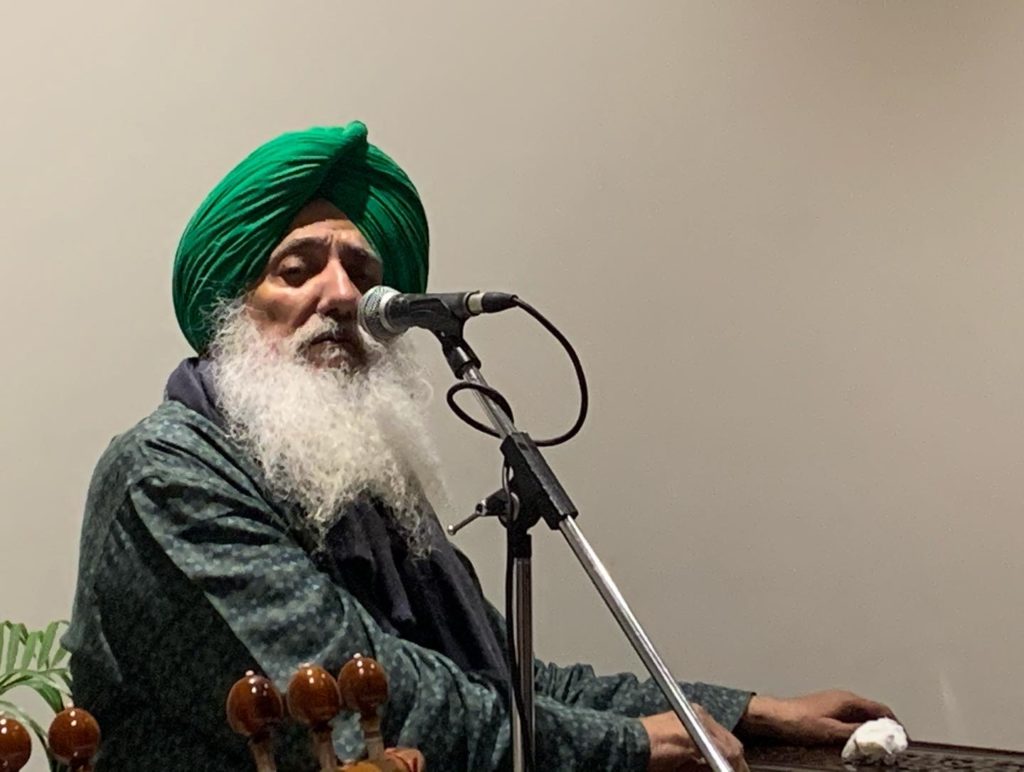
dr. madan gopal singh
Dr Madan Gopal Singh retired from a Delhi University after teaching English literature for 42 years. He has since been travelling all over the world giving music performances and conducting workshops in various universities and colleges.
Dr Singh holds postgraduates degrees in English Literature and Linguistics from the University of Delhi and Jawaharlal Nehru University respectively. Additionally, he has India’s first Ph.D on cinema undertaking a semiotic study of some the seminal film texts from the thirties and the sixties.
Among the institutions and universities where he has conducted workshops and lectured are Chicago University on the sacred music of North India, Hofstra University on the hermeneutics of the sacred word, Framingham University on music (all from US), University of British Columbia on Heer Ranjha, Simon Fraser University on the ways of resisting (both from Canada), School of Oriental and African Studies, London University (UK), on cinema, sufism and cultural histories at CEPT (Ahmedabad), Adishakti (Pondicherry), on cinema at NID (Ahmedabad), St Xavier College (Mumbai), on Indian aesthetics and the cinema of Mani Kaul at Visva Bharati (Shanti Niketan, Bolpur), World Literature Centre, Dhaka on Tarkovsky’s cinema, a series of open workshops and lectures at the Smithsonian Institute on the Secular Ethos of the Sacred with reference to the cultural exchange during the days of Silk route. There are many other universities, schools and colleges where he has initiated cultural dialogues around the themes of histories and memories.
He has performed extensively as a singer in some of the most prestigious festivals of the world including the Festival of India at Brussels, the Alchemy Festival / Jahan-e-Khusrau Festival at the Southbank Centre, London, Smithsonian Silk \ Route Folk Festival, Washington, World Sufi Spirit Festival, Lahore, World Sacred Spirit Festival, Jodhpur, World Music Festival, Trondheim, Norway, World Book Fair, Frankfurt, Theatre Biennale, Bonn, Evento, Bordeaux, Parramatta Southasian Festival, Parramatta, Sydney, Another Passage to India, Geneva, Dialog 2004, Barcelona, Sound Res, San Cesario, Torcito, Bari and the list is endless.
He has composed music for the celebrated Pakistani film, Khamosh Pani and, last year, to the Irrfan Khan starer Song of the Scorpion. Among the films scripted by him are Rasayatra (on the life of Pt Mallikarjun Mansur), Name of a River (on the life of the iconic Bengali filmmaker, Ritwik Ghatak) and did dialogues and lyrics of Kayataran, Qissa, Khamosh Pani and Song of the Scorpion.
Dr singh was visitor’s nominee to the International Mahatma Gandhi Hindi University, Vardha.
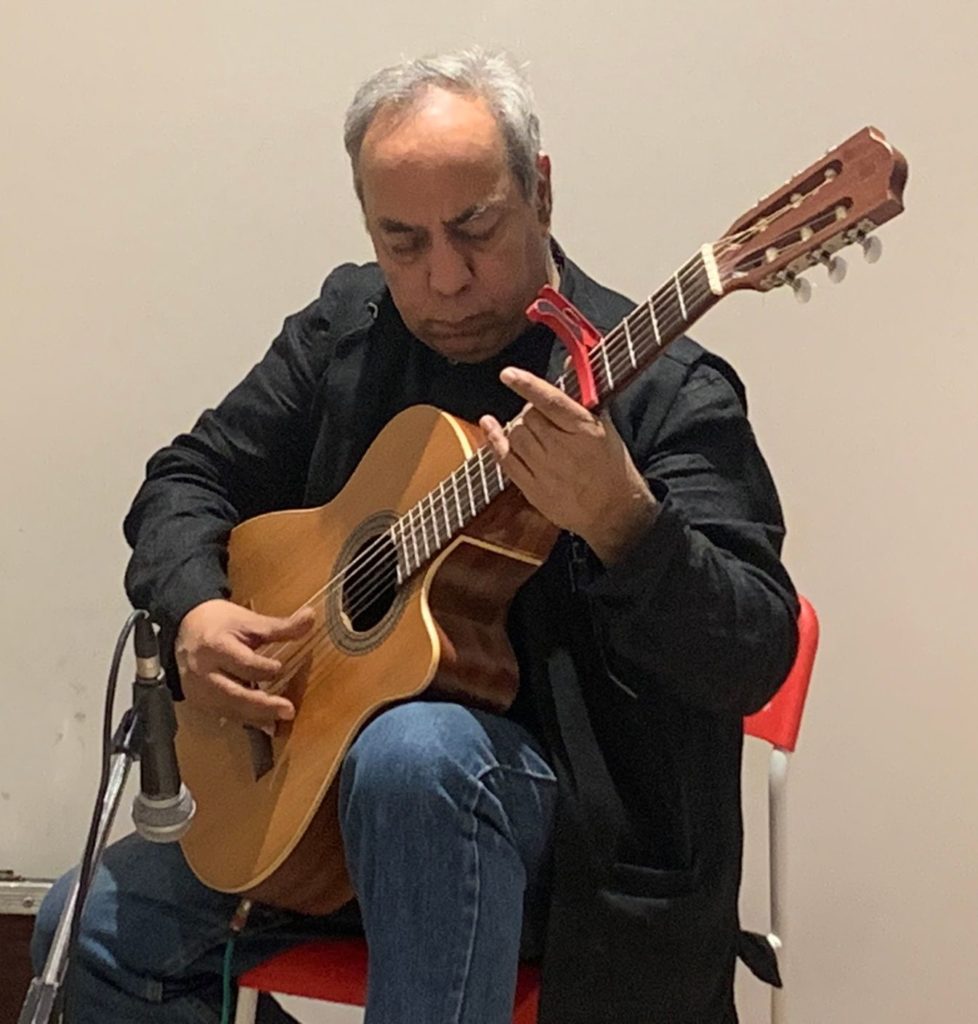
deepak castelino
https://oneworldmusic.in/teacher-profile/deepak-castelino.html
Deepak Castelino is an accomplished guitarist and banjo player who has been performing on stage for over thirty-five years. Essentially trained in the western tradition, Deepak has scored, and recorded music for English and Hindi films (“Electric Moon,” “In Which Annie gives It Those Ones,””Khamosh Paani,””Milk and Opium,””I Am Kalaam”), theatre and television commercials.
Deepak has participated in international music residencies and performed on stage for over 25 years with renowned Sufi music exponent and academician Dr. Madan Gopal Singh in Pakistan (2001 and 2006), Switzerland (2004), Italy (2005), Germany (2006), Belgium (2006), Nepal (2010 and 2013), United Kingdom (2011, 2016 and 2017), France and Australia (2011), United States (2014 and 2017), Canada (2014 and 2017) and Muscat (2015).
Deepak’s versatile repertoire includes traditional English and Hindi folk music, jazz, and popular western music. He is one of Delhi’s best-known live music entertainers and performs extensively at private and corporate parties, and social causes. In addition, Deepak teaches students, young and old, to play guitar. He conducts guitar workshops regularly at prominent cultural venues, institutions & schools across the country for students, educators, and enthusiasts.
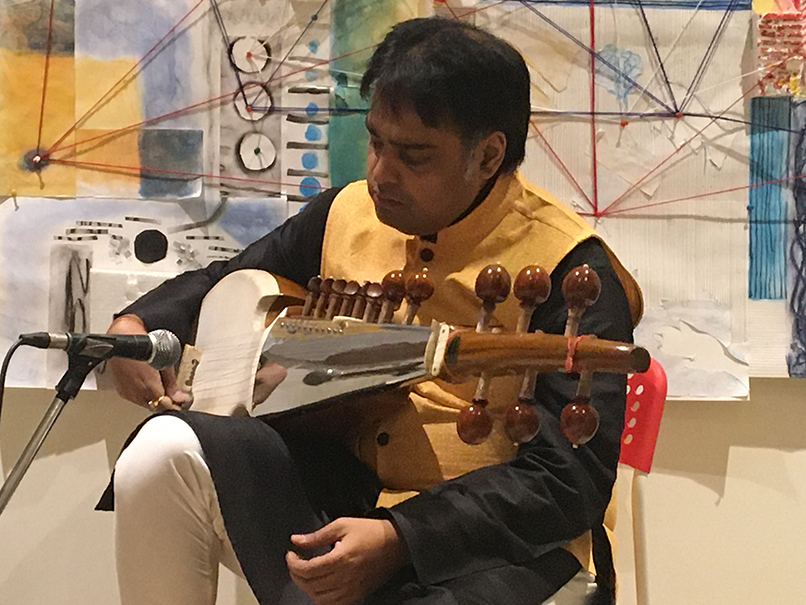
pt. preetam ghoshal
https://in.linkedin.com/in/pritam-ghosal-1a4b6710
Pritam ji was born into a musical family – grandfather Late Shri Jaharlal Ghoshal was a well-known singer & percussionist, father Shri Arun Kumar Ghoshal is a violinist and uncles – Shri Barun Kumar Ghoshal and Shri Arup Kumar Ghoshal – are each a percussionist & a vocalist, respectively.
Pritam’s first lesson in vocal music was at the age of 14 from his father. He was introduced to the sarod by Shri Pranab Naha, disciple of the great sarod maestro Pandit Radhika Mohan Moitra. In 1995 he received the blessings of from the legendary sarod maestro Ustad Amjad Ali Khan and has since been his desciple.
Pritam is a Sarod Player with full of energy and modern approach towards his music. His purity of notes, resonant strokes and clarity are the key to his soulful Sarod which transports the audience to sublime dimensions.
Along with great talent, Pritam ji also carries kindness and a disarming fondness for food.
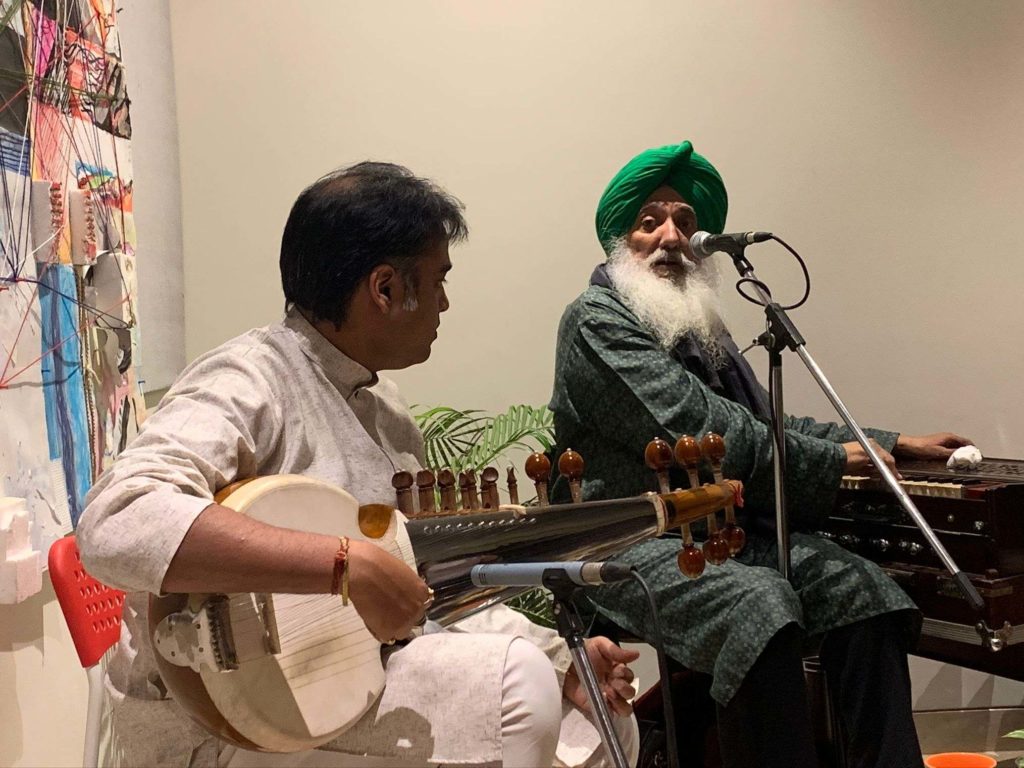

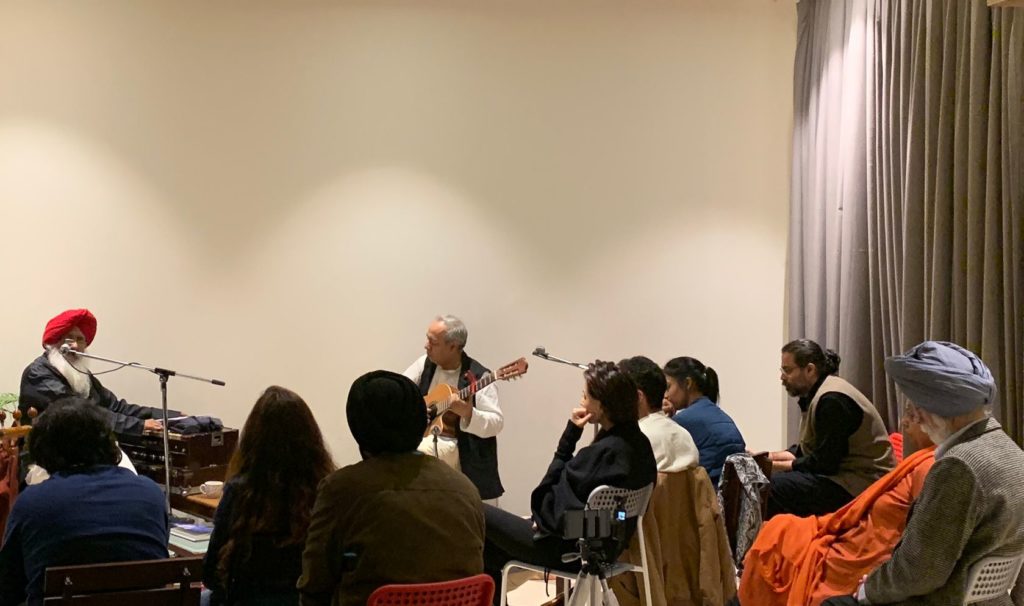
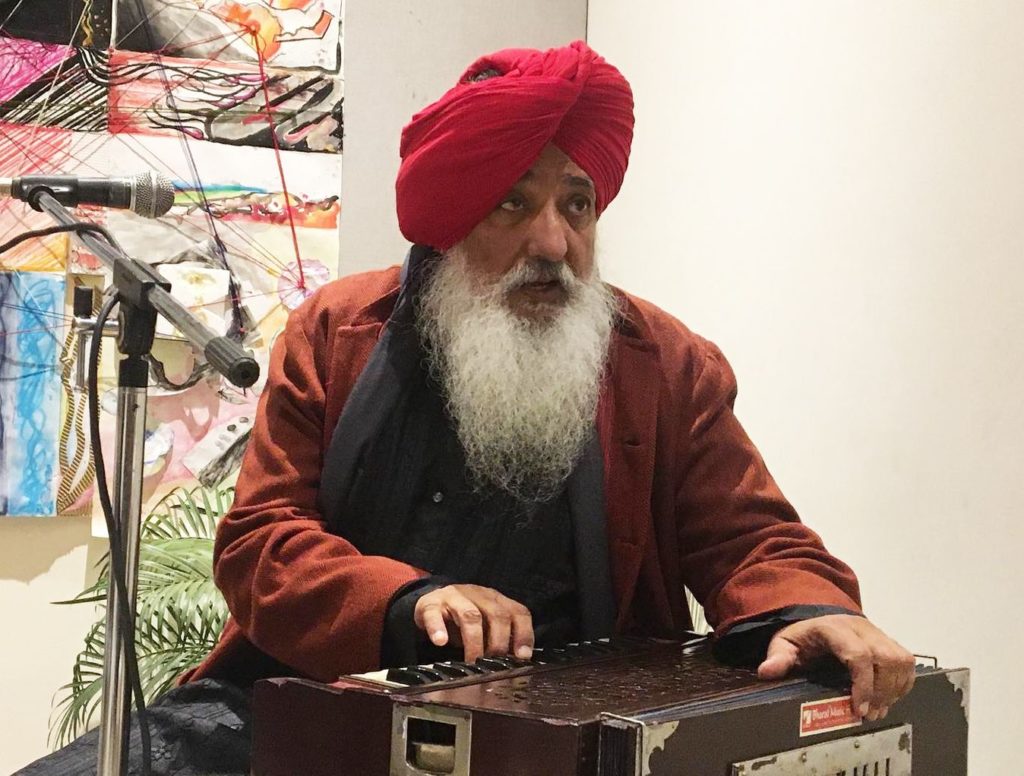
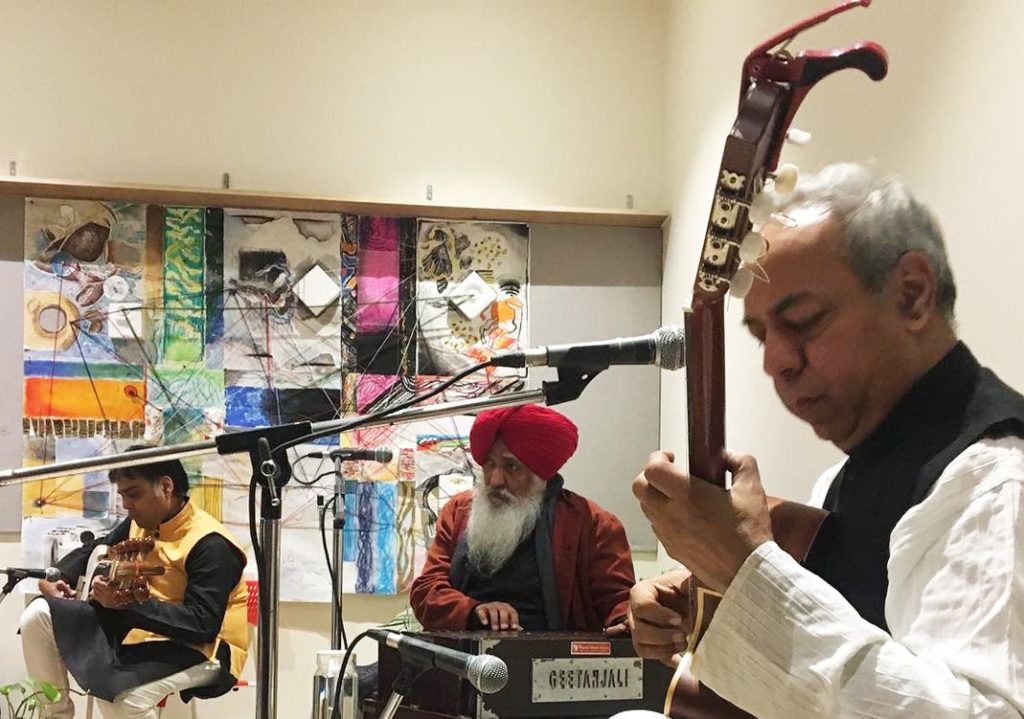
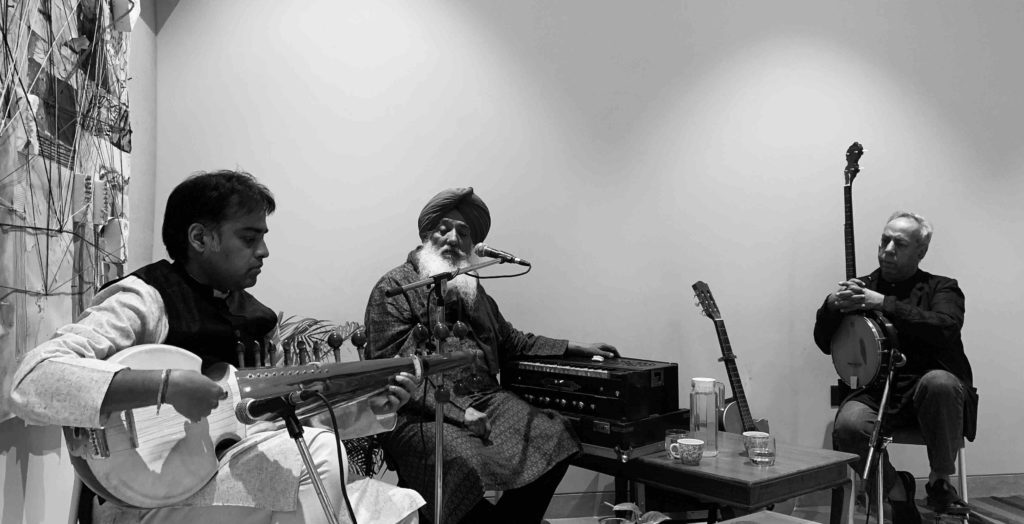

 malkum
malkum